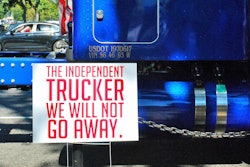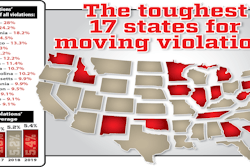 The so-called ABC test institutes a three-point criteria for determining whether a worker can be classified as an independent contractor. For trucking, that relates to loads that motor carriers can contract to independent contractor drivers, such as leased owner-operators. The B portion of the ABC test is widely interpreted as prohibiting motor carriers from contracting with such owner-operators. The PRO Act, introduced in Congress last month in both chambers of Congress, would institute a national ABC test criteria for determining worker classification.
The so-called ABC test institutes a three-point criteria for determining whether a worker can be classified as an independent contractor. For trucking, that relates to loads that motor carriers can contract to independent contractor drivers, such as leased owner-operators. The B portion of the ABC test is widely interpreted as prohibiting motor carriers from contracting with such owner-operators. The PRO Act, introduced in Congress last month in both chambers of Congress, would institute a national ABC test criteria for determining worker classification.
A bill making its way through the U.S. House would follow in the footsteps of California’s A.B. 5 law, passed in late 2019 and codifying a prior court decision, by severely curtailing the ability of leased owner-operators to haul freight for larger motor carriers.
The Protecting the Right to Organize (PRO) Act of 2021, in addition to other broad reforms to the nation’s labor laws, would institute the so-called ABC test for determining whether a business can contract work to an independent contractor. In the case of trucking, that means a motor carrier contracting loads to a truck driver, often via the common leased owner-operator model, in which a driver owns their own truck and business and runs under the authority of a larger carrier. The PRO Act was introduced in early February in both chambers of Congress.
Trucking groups say the leased owner-operator model, which accounts for some hundreds of thousands of operators, would be dashed by the ABC test. “Whether it’s the language that exists in this bill or California’s A.B. 5, it’s certainly not friendly toward the business model that has been employed in this industry for decades,” said David Heller, vice president of government affairs at the Truckload Carriers Association. “It jeopardizes the opportunity to work toward the American dream that has permeated trucking and proven itself over the years.”
Heller pointed out that many trucking companies in existence today, including some of the country’s largest fleets, originally hung out their own shingle as a leased owner-operator before expanding from there.
There’s a strong chance the U.S. House passes the legislation within the coming months, if not weeks, said Joe Rajkovacz, head of government affairs for the Western States Trucking Association. WSTA has been on the front lines in recent years of the fight against ABC test laws and court decisions in California, and Rajkovacz has seen firsthand the effects that this type of regulation can have.
Virtual elimination of owner-operator leasing would, Rajkovacz contends, severely stunt the entire owner-operator model. “The pathway to getting your own authority is by becoming an owner-operator leased to a motor carrier," he said. Absent that stepping stone, there are few realistic opportunities for drivers to transition directly from being employee drivers to independent operators, he adds.
RELATED: ABC test laws are coming. Can the owner-operator model survive?
Rajkovacz sees the push by Democrats in the U.S. House as out of step with the will of the voters. For example, he points to the Proposition 22 ballot measure in California from November, which scaled back the state's ABC test as it applies to certain industries, including ride-share companies. That measure passed with nearly 60% in favor, even in a state as politically blue as California, he said. “This is the kind of legislation that could swing the House” in the 2022 mid-term elections, he said, away from Democrats and to Republicans.
The Owner-Operator Independent Drivers Association on Monday filed a letter to the U.S. House stating their opposition to the PRO Act. Signed by OOIDA President and CEO Todd Spencer, the letter acknowledges issues of misclassification of drivers by motor carriers and abusive lease-purchase arrangements. But the PRO Act goes too far, Spencer writes, by effectively quashing the leased owner-operator model that has "provided millions of truckers the opportunity to be true independent contractors and small-business entrepreneurs."
Should the legislation pass the House, it would have a tougher time passing the Senate, where the balance of power is nearly dead-locked. The upper chamber is split evenly 50-50 between Democrats and Republicans, with Vice President Kamala Harris serving as the tie-breaking vote when necessary.
Rajkovacz says a few moderate Democratic Senators, such as West Virginia’s Joe Manchin and Arizona’s Krysten Sinema, could swing the chamber against such sweeping legislation. Proponents of the PRO Act “I think will face disappointment in the Senate,” he said. “They’re going to have a tough time convincing moderate Democrats to sit in Washington and say, ‘We’re going to overturn right-to-work laws in half of the states.’ Because the bill does that, too.”
Likewise, Heller said TCA and other trucking groups are making appeals to Congress to consider the impact the legislation would have on trucking, particularly the long history of success of the leased owner-operator model. “I get that there are bad apples,” he said of motor carriers that abuse the independent contractor model. “But the number of success stories far outweighs the negative ones.”
He encouraged owner-operators to call their Representatives and Senators in Washington and tell their success stories — and how laws like the PRO Act would have stymied them from getting off the ground. “Tell them your story. Tell them why you wanted to be an owner-operator -- so that you can be your own boss and manage what you see as your future. Tell them why you’ve chosen to go down this road. And tell them this would interfere with the ability to live out the dream of being an independent business person."
The pro-labor groups, said Rajkovacz, “will be pulling out all the stops” to try to see the legislation passed. However, opposition to the PRO Act will also be broad and stiff, he said. “The trucking industry isn’t going to be alone in fighting this. This bill is monolithic in its impact.”











